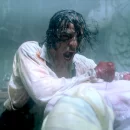08.21.2009 | By Jack Rico |

Inglourious Basterds is a collection of brilliantly crafted scenes, often interrupted by Quentin Tarantino’s ego. Concerned that we might forget who’s directing, he reminds us constantly that this isn’t just any old World War II film. The movie could have been one of the great cinematic works of this decade, if not for Tarantino’s compulsion for attention, which overshadows the craft and the audience’s experience.
Set in Nazi-occupied France during World War II, the film follows a group of Jewish-American soldiers known as “The Basterds” (Brad Pitt, Eli Roth, Til Schweiger), chosen to spread fear throughout the Third Reich by scalping and killing Nazis. They soon cross paths with a French-Jewish teenage girl (Mélanie Laurent), who runs a movie theater in Paris, which becomes a target for the soldiers.
Don’t expect Kill Bill. This is Tarantino’s new evolution, a director who has grown in every way, except as a storyteller. The film is supposedly about Nazi killers during WWII, but it’s really about the love of cinema—Tarantino’s love of cinema. “Can it be?” you might ask. That’s exactly what I thought when the movie ended. The constant dialogue references to French and German classics are unavoidable, but regrettably, they disrupt the pace of the film in their effort to pay homage. As a result, the audience is taken for a bit of a switch-and-bait experience. The crazy part is that it’s a delightful switch-and-bait. Expect a beautiful, meticulously crafted visual cinematic experience, highlighted by an Oscar-winning performance from Christoph Waltz as Col. Hans Landa and potentially Mélanie Laurent as well.
The opening scene is riveting, one of the most memorable sequences Tarantino has ever put on screen, rivaling Pulp Fiction. It’s elegant, sophisticated, tense, and engrossing. However, at times, the film falters, slipping with miscasting choices and a somewhat anticlimactic ending. We witness a director trying to find himself as the film unfolds. It’s not particularly admirable, but it’s certainly interesting.
What you’ll appreciate about Inglourious Basterds is its compelling story concept, artistic cinematography, Tarantino’s directorial tone and mood, and Waltz’s mesmerizing and terrifying performance. What you might not like is that you paid to see a movie about Brad Pitt killing Nazis, but instead, you get a film about the romanticism of world cinema and Tarantino’s place in it. Go figure.




























